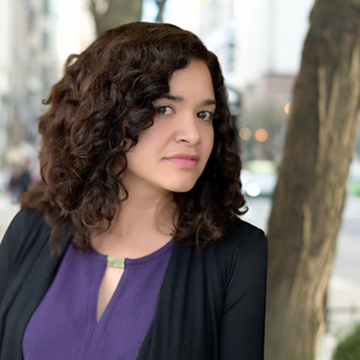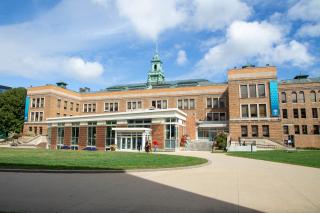On September 20, ODEI hosted a webinar with Project Shema, entitled “Understanding Antisemitism in the Current Political Climate.” Developed during the aftermath of the Hamas attack in Israel on October 7, 2023, this webinar, led by Sophia McGee, defined antisemitism, contextualized Jewish identity, and suggested how participants may empathize with the Jewish community.
Established by Simmons’ Office of Diversity, Equity, and Inclusion (ODEI), the Listening and Learning initiative “allows us to explore current topics of DEIJ [diversity, equity, inclusion, and justice] and engage with experiences that may differ from our own to help support the growth and development of the Simmons community,” said Dr. Nakeisha Cody, Vice President of Student Success and Diversity.
As part of this programming, ODEI invited Project Shema, a nonprofit training and support organization, to conduct a webinar with Simmons students, faculty, and staff on September 20. (ODEI hosted an earlier event on this topic for faculty and staff on December 13, 2023, led by Zackary Schaffer, Co-Founder of Project Shema).

The webinar, entitled “Understanding Antisemitism in the Current Political Climate,” focused on “identifying and addressing antisemitism in contemporary circumstances, particularly in a time of crisis like today,” said Sophia McGee, a Project Shema facilitator and coach who led the event. McGee also serves as the Director of Student Engagement within the Central Office of Student Affairs at the City University of New York (CUNY), where she oversees all 25 CUNY campuses. She is a founding member of the Center for Ethnic, Racial, and Religious Understanding (CERRU) and a lecturer in history at Queens College, CUNY. Her scholarly interests include the Israeli-Palestinian conflict.
Although McGee has researched and taught courses on the Middle East, her webinar focused on antisemitic language and acts perpetrated in the United States. “It is extremely important to resist language that dehumanizes any individuals or groups. We must focus our criticisms on political leadership, not people,” she emphasized. “Antisemitic actions and language are a threat to democracy and all marginalized people in this country.”
Personal Motivation
McGee began her presentation with a personal anecdote about what inspired her to pursue DEI-related work. “Why I am called to do this kind of work can be traced back to a single incident, when I received a family tree in the mail from one of my aunts,” she explained. The family tree showed the paternal, American-Guatemalan branch of her family to be big and thriving, but the maternal, European-Ashkenazi Jewish side appeared truncated, with many X’s inscribed over ancestors from earlier generations.
“As I continued to study my family tree, I noticed that one tendril delicately made its way toward the sun,” observed McGee. Remarkably, this branch of her Jewish family survived World War II, after spending a few years hidden in the barn of a Polish Catholic couple.
“I find the significance of my family’s survival very profound. People who were nothing like me [culturally] decided that hiding members of my family was the right thing to do, even though it was incredibly dangerous,” said McGee. “Following this example of allyship, I think that it is very important to jump in the way of harm — whether it is physical, emotional, or psychological harm directed to my own [Jewish] community or any other community.”
Promoting Empathetic Listening with Project Shema
Project Shema is a training and support organization “focused on addressing contemporary antisemitism with an emphasis on how anti-Jewish ideas and implicit biases can be carried alongside conversations about Israel and Palestine.” While Project Shema is not an Israel advocacy group, its programs and resources help depolarize “difficult conversations around anti-Jewish harm to strengthen allyship for and within the Jewish community.”
McGee’s webinar defined antisemitism as the justification and normalization of violence against Jews. “Antisemitism is systemic in our society,” explained McGee. “We encounter it explicitly [with White supremacists] or implicitly [through unintentional biases].”
In combating antisemitic acts and language, Project Shema embraces the virtue of listening. In addition to being a reference to Jewish prayer, “Shema is a Hebrew word that means ‘to listen,’ and that is one of our core values,” said McGee. “We must be able to listen to each other with empathy, even when we don’t agree.” She also stressed the importance of curiosity, sensitivity, and patience.
Contextualizing Jewish Identity
As McGee explained, gaining a better understanding of Jewish history, identity, and lived experiences marks the first step toward challenging antisemitism. “A fundamental problem is that most people misidentify Jews. . . . Many people assume that Jews are a religious group and/or are a White group. But these assumptions flatten their multilayered identities,” she said. “Jews are a people, but they represent different races, cultures, nations, languages, and diasporas . . . . And you do not have to be religious to be Jewish.”
The (mis)racialization of Jews was a key insight from McGee’s webinar. “Not all Jews are White. There are many Jews of color in this country, including Latinx Jews, Black Jews, Asian Jews, and Sephardic Jews. . . . Unfortunately, Hollywood and popular culture often represent Jews as White, which contributes to an overall misunderstanding,” she said.
McGee noted that Jews are typically victimized for racial, as opposed to religious, reasons. Historically, Nazis and other White supremacists racialized Jews as inferior and non-White. By contrast, the German construct of the “Aryan” stood in for a pure, White, and superior racial identity. These absolute racial categories continue to be projected in contemporary discourse.
In addition to peoplehood and race, the diaspora comprises another important element of Jewish identity. “I call Jews a diasporic population,” says McGee. During the webinar, she showed a map detailing the numerous expulsions of Jews over many centuries. “Over the last 500 years in Europe alone, you can see cycles of expulsion, flight, relocation, and sudden danger among the Jewish people,” she said.
The anxiety accompanying relocation is not an isolated incident, but rather a pattern throughout Jewish history. “The fear of suddenly having to leave is a common Jewish experience . . . And this is an unseen trauma that many Jews carry with them,” noted McGee.
Beyond the Binary
In her presentation, McGee discussed the problem of binary thinking. Specifically, she addressed the powerful vs. oppressed paradigm, in which privileged and powerful individuals dominate colonized and oppressed individuals. Problematically, this dualistic system does not allow for nuance.
“When Jews get unilaterally associated with power and privilege, then it becomes harder for people to grapple with systemic antisemitism,” explained McGee. “People assume that Jews must be doing fine if they are educated, rich, and powerful, which presumes that all Jews are safe and secure.”
However, as the expulsion map McGee shared earlier demonstrates, “The safety and status of Jews can shift suddenly, and this seems to be a signature element of Jewish identity, as my own family experienced during World War II.” Evidently, Jews, like many other groups, do not fit well within a simplistic taxonomy.
When binary thinking gets applied to contemporary contexts (namely the Israeli-Hamas war), it thwarts empathy and listening and bolsters dehumanization and violence. “We need to create empathy for all people at all times,” emphasized McGee. “Empathy is not a finite resource . . . and we must resist dehumanization of any kind.”
Allyship on Campus
McGee concluded her presentation by suggesting ways to cultivate allyship on college campuses. She underscored practices of inclusion (as opposed to exclusion) for everyone within the larger campus community.
McGee continued, “Know that condemning Jews [in your community] for the actions of other Jews or for the state of Israel is a form of antisemitism, and this is unacceptable. Protect free speech but condemn antisemitism as you would for any kind of bigotry or bias.”
Cultivating spaces where students can converse and be heard is central to allyship. “Project Shema has a very relational storytelling model for this reason; everyone has their own story with individual nuances,” said McGee. In these conversations, she advised people to show concern, curiosity, and empathy for others.
Moreover, be intentional about destabilizing binaries and interrogating absolutes. “And don’t forget to take care of yourself,” McGee added.
Project Shema provides further training, coaching, and resources to assist college campuses and other social contexts. McGee invites the Simmons community to reach out to her with any questions or concerns via email ([email protected]).
Join ODEI on September 27 for another Listening Learning event: “Islamophobia in the United States: Understanding the Past and Present of Anti-Muslim Discrimination,” a lecture by Associate Professor of Sociology Saher Selod. (Professor Selod delivered an earlier version of this talk to Simmons faculty and staff on January 19).

